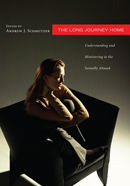A Theology of Sexuality and its Abuse: Creation, Evil, and the Relational Ecosystem, Part 2, by Andrew J. Schmutzer
An excerpt from The Long Journey Home: Understanding and Ministering to the Sexually Abused, edited by Andrew J. Schmutzer. From Pneuma Review Fall 2013.
 The Long Journey Home
The Long Journey Home
A Theology of Sexuality and its Abuse
Creation, Evil, and the Relational Ecosystem
Part 2
by Andrew J. Schmutzer
The Relational Ecosystem: Sexuality Amid Consequences
Christian theology has historically separated culture from nature and nature from theology, which unfortunately has dichotomized the temporal from eternal, material from the spiritual, and so creation from redemption.117 “Science has now stepped in as lord of the domain which man used to refer to Creation.”118 All this has left a fragmented universe119 and a truncated salvation that lacks holism and restoration (cf. Rom 8:19–22).120 This is disconcerting at several levels.
As God’s vice-regents, people live and interact within a *relational ecosystem of dynamic proportion.121 In the garden-sanctuary, foundational bonds are established between: the human and God, humankind and the ground, human and animal, and between humans. Though somewhat distasteful to contemporary readers, in the theology of Genesis, one’s place of origin and the nature of their birth determine the core characteristics and purpose in life.122 In addition to humankind made in the image of God (1:26, discussed above), other significant “bindings” include: the “human” (’ādām) extracted from the “humus” (’ădāmâ, 2:7) and the “woman” (’iššâ) extracted from the “man” (’iš, 2:22). So Adam is uniquely bound to the fertility of the soil as Eve is uniquely bound to the fertility of the body.123 The animals are also “formed out of the ground” (2:19) as “creatures that move on the ground” (1:30). Thus, the biblical notion of self is a relationally “embedded” self, rooted in a web of extended relationships.124 This contrasts with the Western value of the individual as an unembedded self. It’s important to observe then, how the relational ecosystem is shattered in Genesis 3. The mistrust of rebellion breaks this web of relationships (3:5).
The “Bindings” Break Apart
Both functional and relational,125 the compensatory judgments of 3:14–19 follow the order of transgression (serpent → woman → man; cf. 3:1–7).126 Naham M. Sarna helpfully observes that the judgment for each party not only: (1) affects what is of central concern in the life of that entity, (2) but also regulates an external relationship.127 Thus, there is some measure of correspondence between the offense and the judgment, point of origin, and future orientation. Relational hostility will exist between humans and the serpent (3:15).128 The woman will pursue fertility amid relational antagonism with the man (3:16b).129 Similarly, the man pursues the soil’s fertility amid its antagonism (3:17–18). Their points of origin no longer offer security or fulfillment. While the Creation Mandate remains, it is pain and alienation that bind relationships now (Gen 5:29; Eccl 2:23). The man’s “painful toil” (῾ṣābôn, 3:17) working the ground repeats her “pains” (etseb) enduring childbirth (3:16).130 A final bond is ruptured when the couple is “banished” from the presence of the Lord (3:23). Once Abel’s blood soaks into “the ground” (4:10), it “will no longer yield its crops” for Cain (4:12), and ultimately a pervasive “wickedness” reigns in “the human heart” (6:6), stunningly matched by the “pain” (atsab) of the Lord’s grieving “heart” (6:6).131 Sin has ecological and cosmic effects—from creature to Creator, the entire relational ecosystem now suffers (6:7; Deut 11:13–17; Rom 8:22).
Category: Fall 2013, Ministry, Pneuma Review


